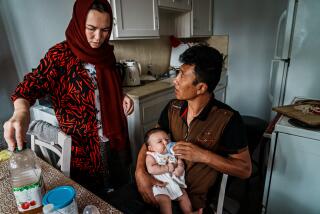Tribesmen Finally Put Viet War Behind Them
- Share via
A bitter and largely forgotten chapter of the Vietnam War was reopened Monday when 213 Montagnard tribesmen, many of whom fought alongside U.S. Green Berets in the conflict, arrived in Los Angeles on a stopover before flying to new homes in North Carolina.
The Montagnards, who said they and thousands of other countrymen had been fighting a bloody guerrilla war against Vietnamese troops since 1975, are the first large group of refugees from Vietnam’s central highlands to immigrate to this country.
As they stood in long lines to go through customs, some of the refugees had tears in their eyes and seemed overwhelmed. Others embraced each other jubilantly and stared curiously out the windows at a parade of jumbo jets rumbling by.
“For us, this is the start of a new life . . . because we have finally left the war, a very bad war behind us,” said Thoraban, a former Green Beret assistant and one of the group’s leaders. “We are grateful that America has not forgotten us.”
Few visitors were on hand to greet the quiet band of refugees, who looked exhausted after a 12-hour flight from the Philippines. But those who did show up recalled the Montagnards’ fighting spirit and the great sacrifices they made during the Vietnam War.
“The Green Berets had no stronger friends in Vietnam than these tribesmen . . . they were truly people who would give their lives for you,” said Pete Laurence, an official with the Special Forces Assn., a nationwide group of former Green Beret officers.
“They were tough and they were loyal,” added Honor Hughes, a former Green Beret from San Jose. “But after the war ended, this country left them behind. Many of them were killed or thrown in prison. We owed them more than that.”
During the war, U.S. Special Forces units recruited and trained thousands of Montagnards, first to defend their villages against the Viet Cong and later to attack Communist soldiers who were infiltrating South Vietnam down the Ho Chi Minh Trail.
Many of the tribesmen, who lived in primitive villages, sided with the Americans after receiving promises that their independence would be respected after the war, according to Han Tho Touneh, a Montagnard refugee living in Sacramento. For years, he explained, the highlanders had resisted efforts to assimilate their culture and economy into the rest of South Vietnam. Siding with the Americans, he added, “was our only choice.”
It proved to be a fateful alliance.
Shortly before Saigon fell in 1975, several Montagnard leaders held meetings with American Embassy officials and were “led to believe” that the United States would give them military aid to continue fighting the Communists, Han Tho said. But the aid never materialized.
When North Vietnamese troops began rounding up Montagnard activists, killing some and jailing others, a group of 5,000 rebel soldiers fled to the jungles. The poorly equipped soldiers waged a losing battle against Vietnamese forces for nearly 10 years and their ranks dwindled down to a few hundred, Thoraban said.
Flight Through Cambodia
Last year, the remaining soldiers fought their way across Cambodia, escaped from a Khmer Rouge detention camp and sought asylum in a Thailand refugee center. Early this year, the U.S. State Department agreed to let the tribesmen immigrate, after a strong public relations campaign by former Green Berets and other Americans who had worked with Montagnards.
Donald Scott, a former medical administrator in Vietnam who spearheaded the effort, said the government was slow to focus on the plight of the Montagnards, but eventually “got on track, once they recognized the historic importance of these people.”
There are only 40 to 50 Montagnards now living in the United States, according to State Department spokesmen. Few of the estimated 200,000 to 400,000 tribesmen remaining in Vietnam have been able to flee because they live in remote highland villages, far from the southern part of the country where thousands of Vietnamese have fled by boat.
Threat From Patrols
Also, large numbers of Vietnamese troops have been patrolling the central highlands since the war ended, thus making escape even more difficult, according to several Montagnard leaders.
The Montagnards, who just completed a six-month “cultural orientation” course in the Philippines to acquaint them with American life, will fly today to new homes in Raleigh-Durham, Charlotte and Greensboro, N.C.
Directors of the state chapter of Lutheran Family Services, a nonprofit organization that is coordinating the resettlement program, said they have lined up jobs, housing and medical counseling for most of the refugees.
More to Read
Sign up for Essential California
The most important California stories and recommendations in your inbox every morning.
You may occasionally receive promotional content from the Los Angeles Times.










